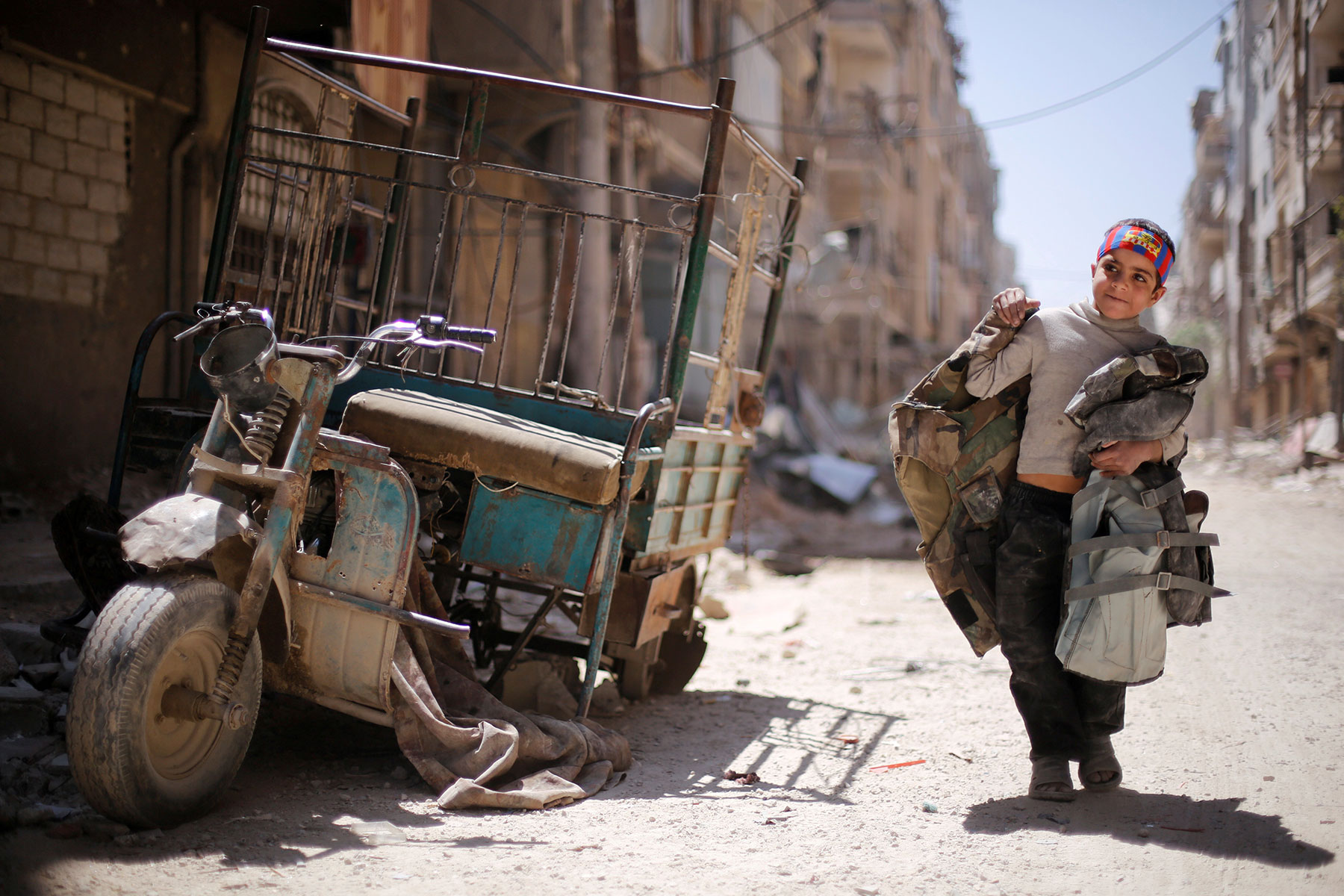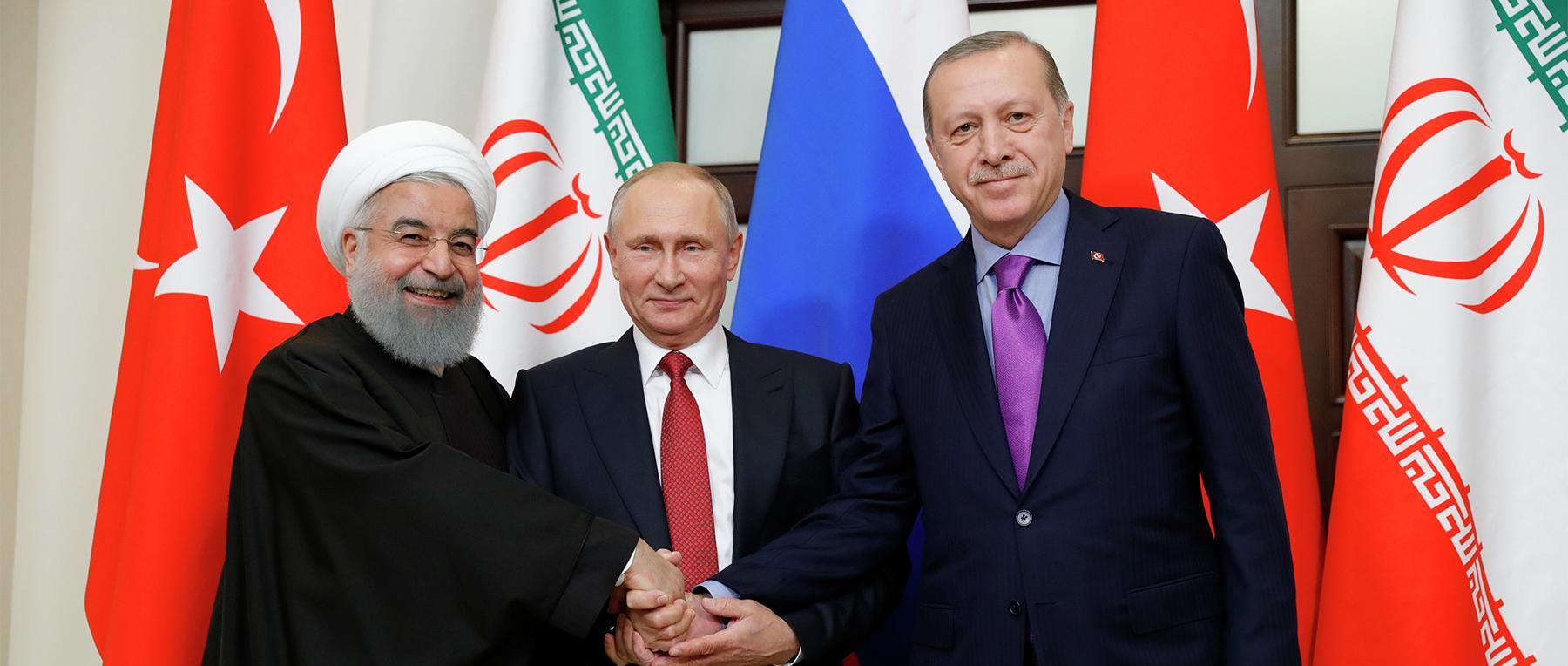Despite eight years of horrific conflict, and over 500,000 thousand deaths, a stable peace in Syria remains elusive. The two writers of this article may disagree on what the final outcome should be, but they share the same concerns regarding the potential risks of new escalations in the near future. Such risks are increasing, partially because of the US decision of withdrawal, and partially because of the crumbling balance of powers on the ground.
Realistically, it is impossible to sit all regional and international players around the same table. Three of them, i.e. Russia, the US and France, have vested interests, a capacity to talk to many regional stakeholders and are permanent members of the UNSC. We suggest that these three powers take a joint initiative and coordinate intensively so as to gather the other powers involved.
Despite eight years of horrific conflict, and over 500,000 thousand deaths, a stable peace in Syria remains elusive. The two writers of this article may disagree on what the final outcome should be, but they share the same concerns regarding the potential risks of new escalations in the near future. Such risks are increasing, partially because of the US decision of withdrawal, and partially because of the crumbling balance of powers on the ground. The four following scenarios are particularly worrying.
— Bashar al-Assad starts a major offensive in Idlib, supported by the Iran-backed militia and by the Russian air force. Though there are efforts on both sides to coordinate their respective actions in Idlib, it is becoming increasingly difficult for the Kremlin to resist pressures coming from Damascus, which insists on launching a large-scale operation there. The apparent trigger would be Turkey’s inability to meet the commitments it made in September regarding Idlib and Hayat Tahrir al-Sham’s growing ability to control most of the “de-escalation zone”. A major operation would entail an outflow of refugees fleeing to Turkey and even to Europe, as well as a potential breakdown of the Russian-Turkish cooperation in Syria. This scenario could also generate a new crisis in the relations between Russia and the West. The latter would be even more acute if chemical weapons were to be used, thus triggering a military action led by the US and its allies.
— The Turks and the Kurds resume fighting in the North. Given the announced US military pullout, the Turkish army could intensify its current operations against the Kurds in the North. Ankara made it clear that its intention is to make progress in the Kurdish-controlled areas, and to introduce an Ankara-sponsored "buffer zone" (or a "safe zone") on the Turkish-Syrian border. In this scenario, the Kurds will try to find an agreement with the Damascus government, with the risk that it might involve Assad’s engagement on the Kurdish side, and a direct confrontation between Damascus and Ankara. In this case, there would also be a crisis between Russia and Turkey, along with new tensions between Russia and the West. Furthermore, the additional gains for Damascus would be followed by a resurgence of terrorism in Syria and Turkey.
— The South-West Agreement falls apart. The Iranians and the Shia militia would then return to the Golan Heights and would directly confront the Israeli forces. Israelis would reciprocate by intensifying their air raids in Syria. Hezbollah activity at the Lebanese-Israeli border could resume. We could imagine a US commitment to back Israeli’s escalating stance, along with Israel’s more assertive military presence in Syria, and potentially direct Israeli action on the Iranian territory itself. In that case, one could not exclude the possibility of a huge attack led by Hezbollah on Israel, and eventually a direct US military action against Iran, thus placing Moscow in a very difficult position.
— The Russian-Iranian partnership in Syria collapses. The once implicit competition between Moscow and Tehran for influence in Damascus would then become explicit. Pro-Russian and Pro-Iranian military groups in Syria would most likely engage in a fight. Tehran would increasingly accuse Moscow, first to be ‘selling out’ Iranian interests in Syria to Turkey, and second, to fail to punish Israel for its air strikes against Iranian targets in Syria. Turkey and Israel would pressurize Putin to have Russia support them. Iran would feel even more isolated and would become increasingly assertive and uncompromising towards Syria and the MENA region in general. The shattering of the Astana process would contribute to the escalation of violence in Syria.
Each of these potential crises in Syria would have its own logic, dynamics and repercussions. There is no universal insurance policy against all of them. Three general recommendations could however be made.
— First, an alternative to a major offensive on Idlib should be found. One way forward would be to develop a counter-terrorism operation involving the US, European countries, as well as Russia and Turkey in order to handle the HTS case without destroying the whole area.
— Second, it is important that stakeholders find a common position regarding the way to manage the consequences of the US decision to withdraw. A "freeze" of the current situation cannot be envisaged as a sustainable solution. It may however be the least damaging option for the time being. Third, the key priority should be to avoid any escalation on the four fronts mentioned in this article, as well as in other possible scenarios. Here also, close consultations between key actors are urgently needed. Realistically, it is impossible to sit all regional and international players around the same table.
— Third, the key priority should be to avoid any escalation on the four fronts mentioned in this article, as well as in other possible scenarios. Here also, close consultations between key actors are urgently needed.
Realistically, it is impossible to sit all regional and international players around the same table. Three of them, i.e. Russia, the US and France, have vested interests, a capacity to talk to many regional stakeholders and are permanent members of the UNSC. We suggest that these three powers take a joint initiative and coordinate intensively so as to gather the other powers involved.
First published in the Institute Montaigne website.







